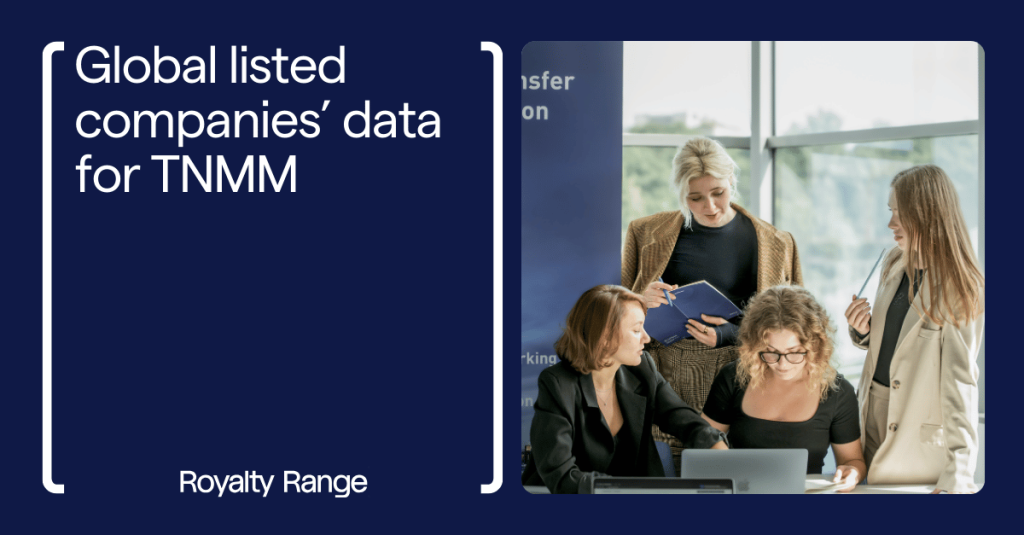Global listed companies’ data for TNMM
RoyaltyRange

The Transactional Net Margin Method (TNMM) is one of the most commonly employed techniques in Transfer Pricing to ensure that intercompany transactions are conducted at arm’s length. Ensuring intercompany transactions are conducted at arm’s length is essential for multinational enterprises (MNEs). By comparing the net profit margin of a tested party to those of comparable independent companies, TNMM provides a solid framework for validating the pricing of intercompany transactions. Global listed companies, with their readily available and reliable financial data, serve as a valuable source for identifying comparables in TNMM benchmarking analysis.
A global listed company has chosen to make its shares available to the public via a stock exchange in different countries, enabling it to raise capital and allowing investors to easily buy and sell shares. This status involves strict regulatory compliance and presents substantial benefits and challenges related to capital access, corporate governance, and meeting market expectations.
Global listed companies operating across multiple jurisdictions must comply with local and international Transfer Pricing regulations to ensure their intercompany transactions are conducted at arm’s length. TNMM benchmarking studies play a crucial role in demonstrating this compliance. Tax authorities globally analyze intercompany transactions to prevent profit shifting and ensure the appropriate tax is paid in each jurisdiction. By performing TNMM benchmarking studies, global companies can produce the necessary documentation to support their Transfer Pricing practices, thus meeting regulatory requirements and avoiding potential legal complications.
Failure to comply with Transfer Pricing regulations can lead to severe financial penalties, such as adjustments to taxable income and the risk of double taxation. TNMM benchmarking reduces these risks by offering solid proof that a company’s Transfer Pricing practices are at arm’s length. Moreover, companies could experience interest charges and fines for underpaid taxes resulting from incorrect Transfer Pricing. Conducting accurate TNMM benchmarking studies helps avoid these financial penalties by ensuring that intercompany pricing is defensible and aligned with market standards.
Global listed companies must adhere to strict financial reporting standards. TNMM benchmarking aligns Transfer Pricing policies with these standards, ensuring transparency and accuracy in financial reporting. Proper Transfer Pricing documentation also supports good corporate governance practices by demonstrating that intercompany transactions are conducted at arm’s length and in the best interest of all stakeholders. This level of transparency is essential for maintaining the trust of investors, regulators, and the broader market.
There are some important aspects of using global listed companies’ data for TNMM:
- Availability and Reliability of Data:
- Availability: Financial data is easily accessible since global companies must disclose their financial statements, providing a wealth of detailed financial information.
- Reliability: Data is generally reliable and audited, ensuring higher accuracy and compliance with accounting standards.
- Transparency: Detailed information about company operations, management discussions, and other disclosures are available.
- Screening Criteria:
- It’s easy to apply screening criteria based on detailed and consistently available financial and operational data.
- Criteria such as revenue size, profitability, and operational status can be applied rigorously.
- Adjustments for Comparability:
- Adjustments for comparability can be easily made since detailed financial and operational data is available.
- Accounting practices are standardized, reducing the need for extensive adjustments.
- Sample Size and Statistical Validity:
- A large pool of potential comparables enhances the statistical validity of the benchmarking analysis.
- Convenient to obtain a robust sample size for calculating the arm’s length range.
- Regulatory and Market Conditions:
- Subject to market examination and regulatory oversight, which can impact financial performance and reporting practices.
- May be influenced by market conditions, investor expectations, and regulatory requirements that differ from private companies.
Global listed companies, due to their regulatory frameworks and disclosure obligations, offer a wealth of data that significantly enhances the accuracy and credibility of TNMM benchmarking studies. This facilitates regulatory compliance and supports effective internal management and strategic decision-making. Additionally, transparent and compliant Transfer Pricing practices support investor confidence and maintain a positive market perception, which is essential for sustaining and enhancing shareholder value.
As global Transfer Pricing regulations continue to evolve, multinational enterprises must stay informed and proactive. Utilizing data from global listed companies for TNMM benchmarking ensures businesses remain compliant, avoid penalties, and maintain financial integrity, ultimately contributing to their long-term success and stability.
Sources:
https://www.sciencedirect.com/science/article/pii/S106195182200026X
https://www.mayerbrown.com/en/insights/blogs/2021/04/the-vanishing-us-comparable
https://akjournals.com/view/journals/204/43/1/article-p75.xml
https://www.taxand.com/wp-content/uploads/2024/02/2655-Taxand-Transfer-Pricing-Guide-05-02-24.pdf